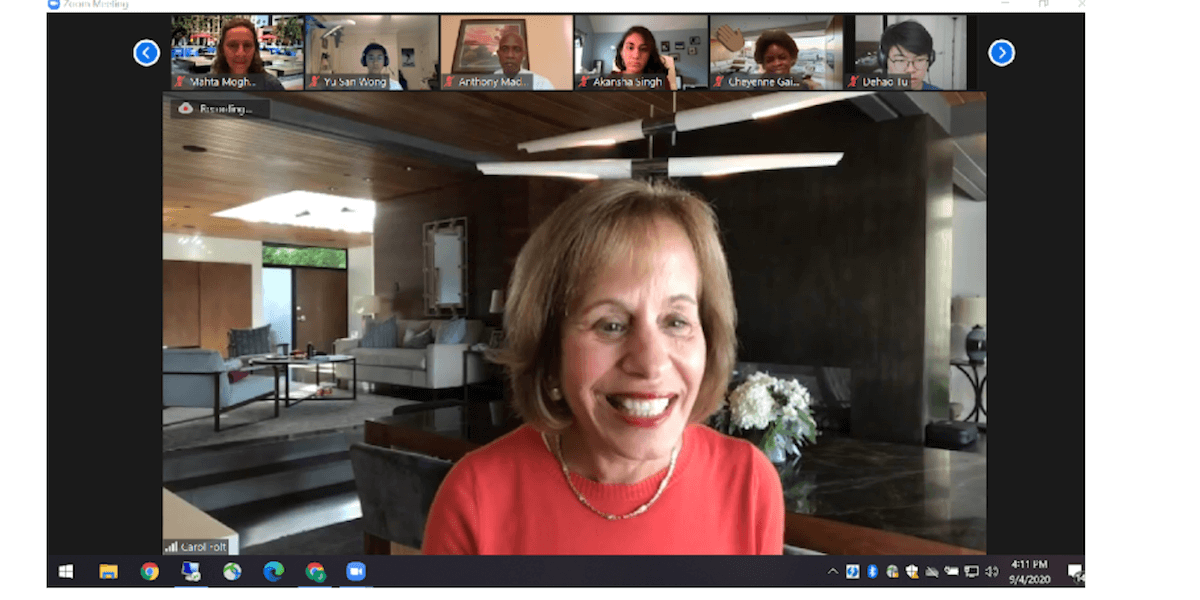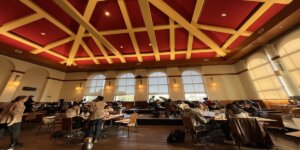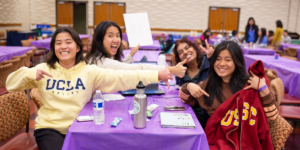
USC President Carol Folt was a surprise guest at this year’s Sustain-A-Thon, the most popular one ever and the first one online. (Photo/Cheyenne Gaima)
USC Viterbi’s fourth annual Sustain-A-Thon hackathon commenced with an etymology lesson from USC Viterbi Dean Yannis Yortsos.
“The ‘thon’ at the end of marathon is often associated with events that last a long time, like running a marathon or competing in a Sustain-A-Thon or a hackathon,” Yortsos said.
While it isn’t unusual for the Greek native to delight students with fun facts about Greek history, there was something very different about this year’s Sustain-A-Thon.
On Friday, Sept. 4, 2020, the USC Viterbi School of Engineering hosted the event completely on-line for the first time due to the COVID-19 pandemic. Over 48 hours, 57 USC Viterbi engineering students located all over the country, and some internationally, competed in teams to address and propose solutions to problems surrounding three sustainability themes: lifestyle, pollution, and recycling.
On Sept. 9, days after the hackathon ended, the winning teams were announced.
Coming in first place for the undergraduate level was Team R, which proposed Clairity — a high altitude balloon system that transports adsorbent materials into the upper troposphere – the lowest layer of Earth’s atmosphere where almost all weather occurs – to capture and sequester atmospheric carbon dioxide. The team of three, including Madeleine Tran and Joseph Weissig, both junior mechanical engineering students and Yusan Wong, a sophomore engineering student, formed randomly on the first day of the competition and impressed judges with the complexity, yet feasibility of their idea.
Team Y won the graduate division. The team addressed all three competition themes with Vert – a “Pocket Points” style app that awards points to users for meeting their lifestyle sustainability goals. Using existing software and hardware, Vert would track user activity like how often you drive your car, how much electricity you use, and how much you shop online by recording the number and size of packages you receive. By reducing consumption, app users could earn points and redeem prizes from company sponsors. Judges praised the team for its innovation and all-encompassing solutions to addressing sustainability.
Victorious Team Y included Martin Martinez, an electrical engineering Ph.D. candidate; Angineh Zohrabian, an environmental engineering Ph.D. candidate; David Rozenboim, an engineering management master’s student; Jorge Vizcayno, an electrical engineering master’s student, and two undergraduates: Jijie Fan, a business and applied analytics major, and Anuj Vasil, a computer science and business major.
Other winning proposals included:
Undergraduate Division
2nd Place — Teeny Farm — a sustainable agriculture app.
3rd Place — Team P — a food waste tracking app.
Graduate Division
2nd Place — EcoChoice – a web browser extension that recommends eco-friendly choices when shopping online
3rd Place — Team S – an eco-friendly plan to treat ballast water using a combination of coagulation, flocculation and fractionation instead of direct seawater.
Each member of the first, second, and third place teams received $200, $100 and $50, respectively.
The virtual format allowed for more students than ever to participate in the competition this year. However, it didn’t come without its challenges.
“It’s a little rough trying to coordinate everyone’s schedules because it’s over Zoom and everyone is in different time zones. For a while it was difficult to get people on one call,” said participant Nick Nuccio, a junior studying chemical engineering.
“But when it ultimately happened, we decided we’d work best by delegating tasks,” he added.
Nuccio’s team, comprised of five USC Viterbi students, tackled the lifestyle theme with Closet, an idea for a sustainable fashion app that informs users of the amount of water and carbon dioxide emissions it took to produce the clothing in their closets.
Additionally, there would be a forum-style feature that facilitated buying, selling, and trading of clothes to encourage users to recycle them rather than throw them away.
Teeny Farm, the 2nd place undergraduate team, proposed a sustainable farm app that would educate users on how to properly grow and care for plants, starting with level-one crops such as sunflowers and then advancing to more care-demanding plants like zucchini or squash. Once app users’ plants were healthy and thriving, they could sell them to other users, sustainably providing organic, nutrient-rich foods to their community. Part of the profits from these sales would subsidize the development and maintenance of community gardens in so-called “food deserts,” urban areas with a high concentration of fast food but few healthy food options.
“The most rewarding part of the Sustain-A-Thon was collaborating with students studying different engineering disciplines and getting an idea of how they approach problems,” said Ceylin Donat, a Teeny Farm member and a senior studying industrial and systems engineering with a minor in philosophy. “Seeing how all of our distinct perspectives came together to propose a creative solution was really interesting.”
Problem-solving through interdisciplinary collaboration was a key pillar of the Sustain-A-Thon. Participants were reminded of this tenet early on in the competition by a surprise guest, USC President Carol Folt, a sustainability advocate who holds a doctorate in ecology.
“One of the reasons that I came to USC was because I knew we could make a huge difference in sustainability,” she said at the Sustain-A-Thon’s kickoff. “Conquering the operational and philosophical challenges associated with sustainability practices is challenging, however, Viterbi students, faculty, and staff have the interdisciplinary backgrounds and quintessential grit to get it done.”
Shortly after her inauguration as president in fall 2019, Folt convened a presidential working group on sustainable education, research, and operations to “provide leadership and guidance and recommend meaningful changes to lessen our environmental impact.”
Working group members include Mahta Moghaddam, professor of electrical and computer engineering and co-director of the Center for Sustainability Solutions at USC. As keynote speaker for the ceremony, the Ming Hsieh Chair in Electrical and Computer Engineering-Electrophysics reminded student participants of the significance of their hackathon work.
“You should think of everything you come up with over the next couple of days as critical to helping the globe correct its course and remedying the adverse effects of climate change and a growing world population,” Moghaddam said. “Remember, matter can neither be created nor destroyed. To make do with what we have, we must come up with sustainable solutions that simultaneously enrich our quality of life.”
All of the students’ hard work over the holiday weekend was rewarded with an invaluable learning experience and newfound comradery.
“We learned so much about ourselves as engineers and problem-solvers over the past 48 hours,” said Rozenboim, a member of Team Y, winning graduate team. “We’re so grateful for this experience.”
Published on September 11th, 2020
Last updated on September 11th, 2020












